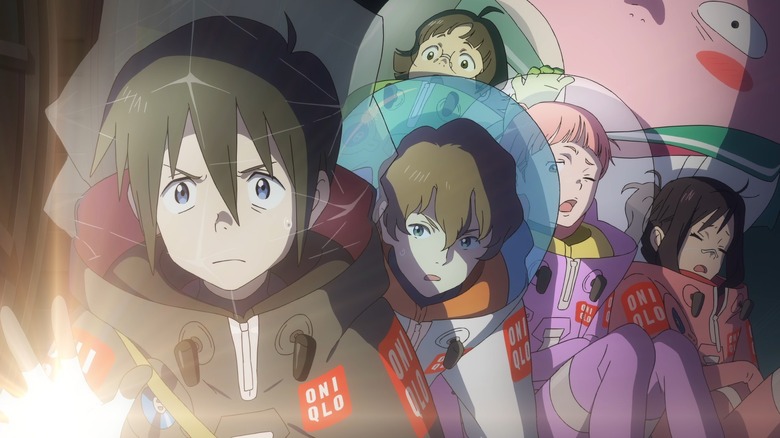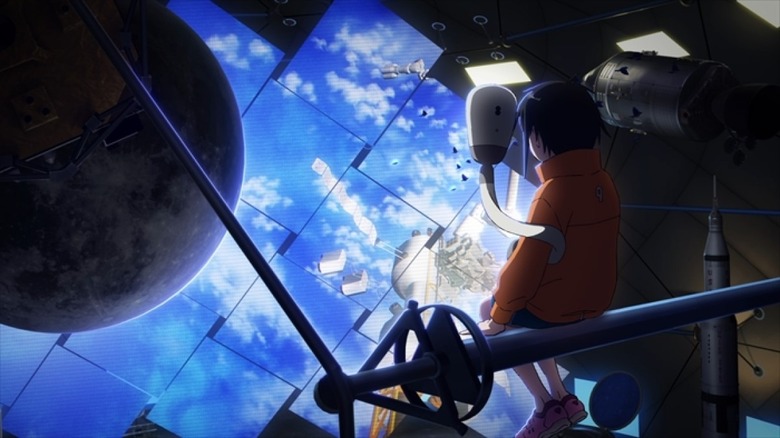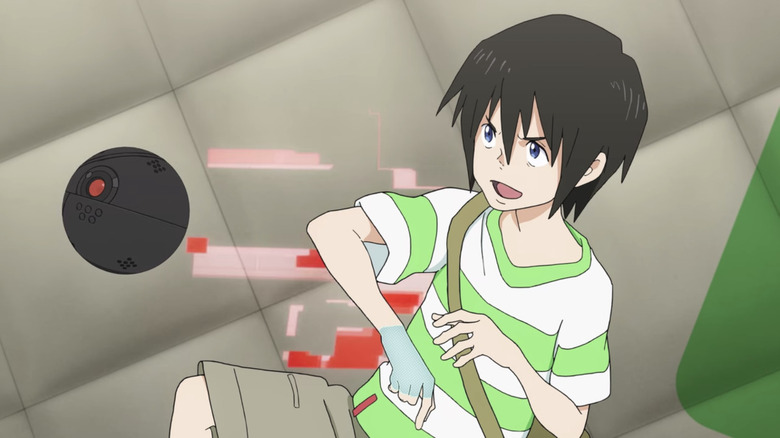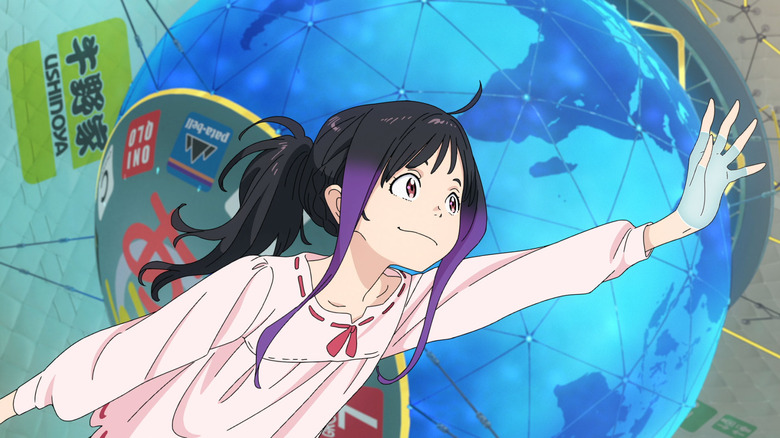The Orbital Children Is A Complex, Thrilling Sci-Fi Adventure About Technology And Transhumanism
(Welcome to Ani-time Ani-where, a regular column dedicated to helping the uninitiated understand and appreciate the world of anime.)
You may not know the name Mitsuo Iso, but he has long been involved with some of the best works of anime, animating some of the best fight scenes in everything from "Mobile Suit Gundam," "Ghost in the Shell," and the stunning Asuka battle in "The End of Evangelion." After a long 15-year-wait, Iso is back to direct a new original anime series, and it may be one of the best shows of the year so far.
"The Orbital Children" takes place in 2045, at a time when space travel is common enough to spawn commercial space stations, and enough people emigrated to a Moon colony that we now have kids born out of orbit. When three Earth-born kids are sent on a promotional trip to the space station to meet the last two Moon-born kids, disaster strikes. What starts as a fun trip for a group of tweens becomes a "Gravity"-style survival thriller, and then a spectacular, philosophical sci-fi epic that evokes everything from "Contact" to "2001: A Space Odyssey."
What makes it great
Mitsuo Iso already presented some fascinating and unusual uses of technology in his previous anime "Den-noh Coil," but Iso also takes advantage of the advancements of technology and the rise of social media these past 15 years to make "the Orbital Children" a painfully accurate portrayal of our relationship with technology. For one, there's the commercialization of space and the ton of sponsors seen on the space station. Like "Ad Astra" putting an Applebee's on the Moon, "The Orbital Children" features a McDonald's vending machine, a space station sponsored by Google, and space suits from Uniqlo.
Likewise, the show heavily explores how technology has become socially ingrained in our lives — one of the kids is an influencer with an obsession of reaching 100 million followers at any cost, even filming herself suffocating to death because it would be very exciting — and even physically ingrained in us, showing wearable smart technology that turns the palm of your hand into a phone, and microchip brain implants that help the moon-born kids survive in orbit.
While many anime and live-action shows and films deal with our dependence on technology, "The Orbital Children" stands out by not focusing on the toxicity of things like commercial space travel or the use of social media as an inherently bad thing. Rather, they are tools with both positive and negative sides to them. Likewise, the show makes an effort to gradually explore how these pieces of tech are still bound to human fallibility. No matter how cool or revolutionary, they are not without flaws, and a big part of what makes the show fun is seeing the kids have to deal with the limitations of the tech. Even the way the kids interact with social media and other technology (everyone has a personal drone in the future) feels natural and relatable without ever feeling the need to mock them. Even the protagonist, a little edgelord wannabe hacker, is relatable and easy to root for.
It is truly a joy to see the way "The Orbital Children" manages to encompass dozens of themes and plots into a tight six-episode narrative without ever feeling disjointed or overwhelming. It goes from being a disaster film about surviving in space and having to manually decompress space suits, to more sci-fi concepts like creating an AI superintelligence and even philosophical extradimensional ideology battles against AI about the difference between humans and humanity, all while still delivering a fun kids-centric adventure that offers legitimate thrills without feeling cheap or overwhelming. The result feels like a classic Spielberg adventure mixed with the philosophical science writing of Carl Sagan, aided by spectacular Zero-G movement animation, as well as a rousing score by Rei Ishizuka which feels evocative of John Williams.
What it adds to the conversation
For most of the show, we hear talks of a dead AI known as Seven, which before dying made a highly encrypted poem that supposedly predicted future events, and once said that humanity had to leave its cradle if it was to survive. The idea of a cradle is a central allegory to "The Orbital Children," as a comfort zone that we have to leave behind in order to advance as a society. In some ways, the show is not only a coming of age story of tweens overcoming adversity and biases to become better people, but also a coming of age to humanity as a whole, a tale of balancing the concept of humans and humanity and what we have to do in order to leave our own cradle and reach the stars.
While the first half of the show is more focused on the survival thriller aspect, the latter half gets a lot more philosophical as it shifts themes to grander ideas about the fate of humanity, AI (which is heavily restricted in the world of the show by UN2 — yes, the sequel to the UN), and even the climate crisis. "The Orbital Children" even argues in favor of the internet as an unfiltered source of all information, both good and bad. At one point, the kids argue whether to connect a new AI to the internet to let it learn about humanity, and when the argument against showing the toxicity of the online world to the AI surges, the show argues, "if you only show a child things that have been edited to your biases, will they grow up to be a good person? If you show them an unfiltered world, will they grow up to be bad?" It's a sentiment that this anime shares with the works of Mamoru Hosoda and its relentless optimism, and it fits perfectly with this story.
Why non-anime fans should check it out
"The Orbital Children" is a dense and complex show, but one that covers a lot of thematic and genre territory, resulting in a sci-fi adventure the likes of which we have not seen in years. It features shocking twists and conversations about predeterminism, fate, love, AI and a lot more, with relatable characters, fantastic animation and a very emotional ending that puts everything into perspective like it was a Rube Goldberg machine. This is already a strong contender for anime of the year.
Watch This If You Like: "Planetes," "Contact," "Close Encounters of the Third Kind."
"The Orbital Children" is streaming on Netflix.



